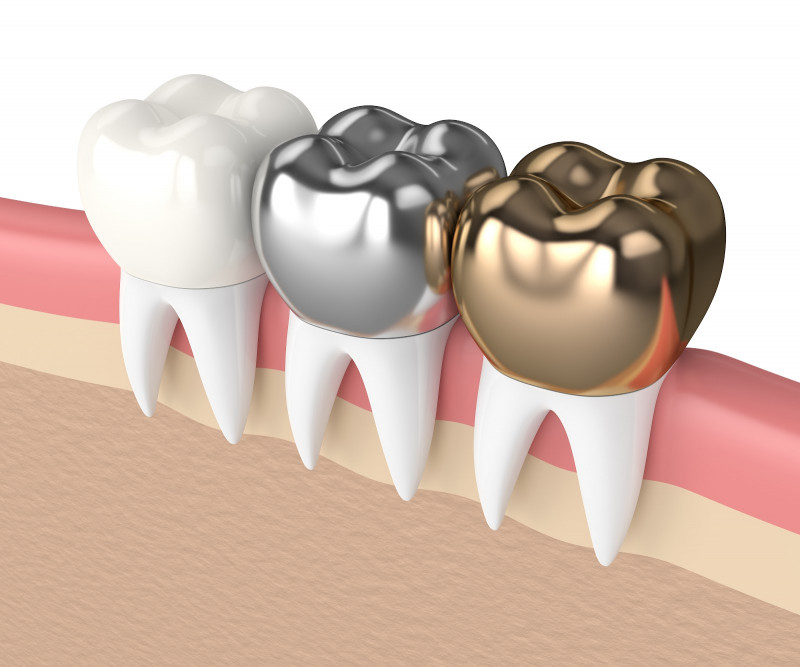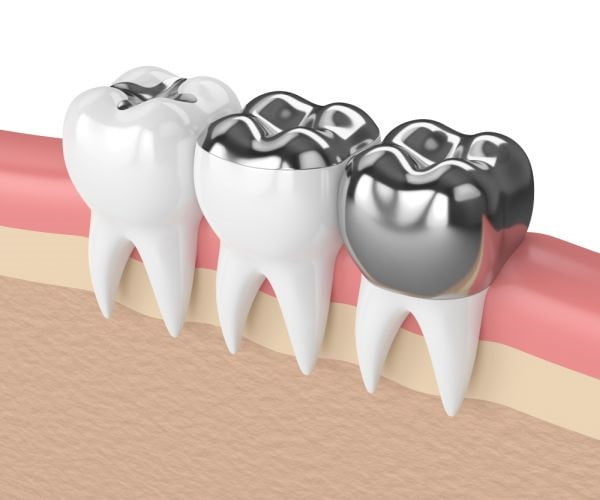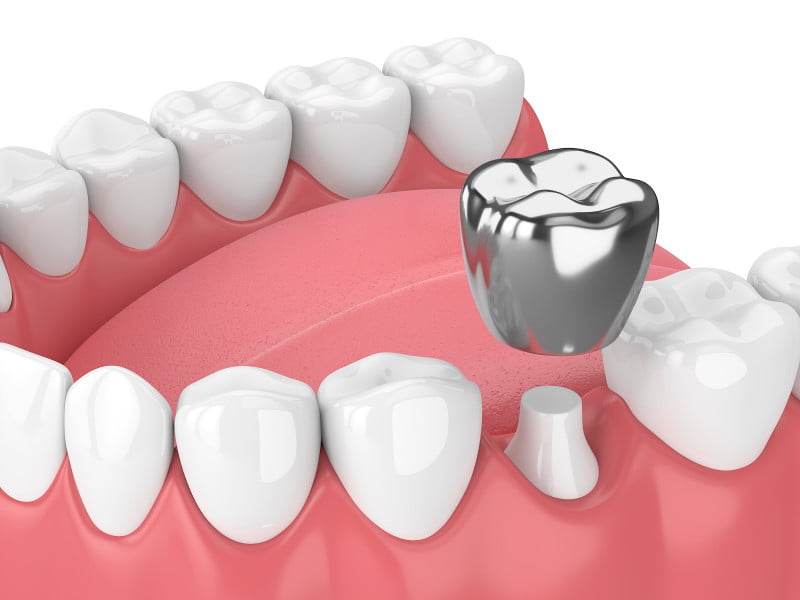Silver teeth crowns are dental crowns made from silver or silver-colored materials, typically dental alloys that contain a combination of metals, including silver. These crowns are known for their durability and strength, making them suitable for restoring posterior teeth, such as molars, where chewing forces are significant.
What are silver teeth crowns?
Silver teeth crowns are dental crowns made of a metal alloy that includes silver. They are also known as stainless steel crowns. These crowns are often used for children’s teeth or as temporary crowns for adult teeth. They are durable and cost-effective, but some people may prefer more aesthetically pleasing options, such as porcelain or ceramic crowns.
The silver teeth crown process
The process of getting a silver dental crown, often referred to as a silver alloy crown or metal crown, involves several steps. These crowns are typically used for posterior (back) teeth, where strength and durability are more critical than aesthetics.
- Dental Examination and Consultation: The process begins with a dental examination. Your dentist will assess the condition of the tooth that requires a crown to determine if a crown is the appropriate treatment option.
- Tooth Preparation: If a silver crown is chosen, the dentist will start by numbing the tooth and the surrounding area with a local anesthetic to ensure you’re comfortable during the procedure.
- Impression: Once the tooth is prepared, the dentist will take an impression (mold) of the tooth and the surrounding teeth. This impression is used to create a custom-fitted crown that matches your bite and alignment.
- Temporary Crown: In many cases, a temporary crown may be placed over the prepared tooth to protect it while the permanent crown is being fabricated in a dental laboratory. The temporary crown is usually made of a temporary material and is not as durable as the final crown.
- Crown Fabrication: The impression is sent to a dental laboratory where the permanent silver crown is fabricated.
- Crown Placement: Once the permanent silver crown is ready, you will return to the dentist’s office for its placement. The dentist will remove the temporary crown (if used) and ensure that the permanent crown fits properly.
Explor more: The modernity of trios 3shape scanner technology.
-

- “The silver teeth crown process”
Advantages of Silver Teeth Crown
Silver crowns are exceptionally durable and long-lasting. They are known to withstand the forces of chewing and grinding, making them an excellent choice for posterior teeth, especially in children.
Silver crowns are often more cost-effective compared to other crown materials like porcelain or gold. This makes them a practical choice, especially for patients with budget constraints. They are resistant to staining and do not require special care beyond regular oral hygiene practices.
The placement of silver crowns is usually a quicker procedure than other crown types. This can be especially beneficial for children or individuals with difficulty sitting through longer dental appointments.
Seemore: Why no dairy after dental implant?
-

“Advantages of Silver Teeth Crown”
Disadvantages of Silver Crowns for Teeth
One of the most significant drawbacks of silver crowns is their appearance. They have a silver-gray color that is highly noticeable, making them unsuitable for front teeth. The aesthetic aspect can be a significant concern, especially for adults or individuals concerned about their smile’s appearance.
Although silver crowns are generally well-tolerated, some individuals may have metal allergies or sensitivities to the materials used in these crowns, leading to discomfort or allergic reactions.
When Is a Silver Tooth Crown Recommended?
Silver crowns are commonly used to restore primary (baby) teeth, especially when they have extensive decay or damage. Since baby teeth eventually fall out, the durability of silver crowns makes them a practical choice to protect and preserve these teeth until they naturally exfoliate.
In emergency situations where a tooth has sustained severe damage or a fracture, a silver crown may be used as a temporary or interim solution to provide immediate protection to the tooth until a more permanent restoration can be placed.
Seermore: Dental implant insurance coverage.
Cost Considerations for Silver Teeth Crown
If you have dental insurance, check whether it covers the cost of silver crowns. Dental insurance plans may partially or fully cover certain dental procedures, including crown placement. Review your policy’s coverage and any associated copayments or deductibles.
The location of the tooth that requires the silver crown can affect the cost. Crowns for molars and premolars, which are located at the back of the mouth and undergo more significant chewing forces, may be more expensive than crowns for front teeth.
Caring for Your Silver Teeth Crown at Dentist For Life
Schedule and attend regular dental check-ups at Dentist For Life as recommended by your dentist. These check-ups allow your dentist to assess the condition of your crown and the underlying tooth, as well as identify any potential issues early on.
Affordable dental care in Marysville emphasizes the importance of flossing for maintaining oral hygiene. It is essential to clean between teeth and around the base of the crown, where plaque can accumulate. Using dental floss or interdental brushes can effectively clean these areas, but it is important to be gentle to avoid damaging the crown.
In addition to regular flossing, consider incorporating an antibacterial mouthwash into your oral hygiene routine. This can help reduce bacteria in your mouth, minimizing the risk of gum disease and decay around the crown.
It is also crucial to maintain a regular schedule of dental appointments for cleanings and check-ups. This allows your dentist to monitor the condition of your crown and address any concerns promptly. Affordable dental care in Marysville emphasizes the importance of these key practices for maintaining oral health and preserving the integrity of dental crowns.



